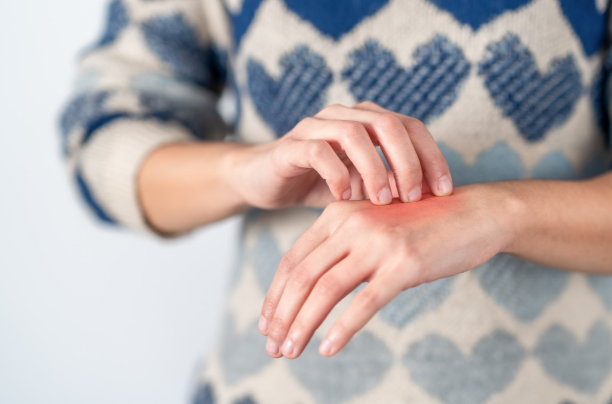Psoriasis is a long-term, autoimmune skin disease that causes crusty, flaky and red patches of skin covered with scales.
Other symptoms of psoriasis include:
- Smaller, scaly spots of skin;
- Burning, itching, or soreness;
- Stiff and swollen joints;
- Cracked, dry skin that might itch or bleed;
- Pitted, thickened, or ridged nails.
These patches can be itchy or sore and can appear on your knees, elbows, scalp and lower back. However, it can appear anywhere on your body.
Psoriasis is a long-lasting disease and usually involves periods when you have no or mild symptoms, followed by periods when these symptoms are more severe. Symptoms of this condition can develop at any age, but it often develops in adults under 35 years old and affects both women and men equally.
Your doctor can diagnose psoriasis based on the appearance of your skin. The exact type of psoriasis is determined with the help of a biopsy sent to the laboratory.
What Are The Causes Of Psoriasis?
Here are the most common psoriasis triggers are:
- Stress;
- Infections, both of the whole skin or systemic such as strep throat;
- Skin injury, like a bug bite, a scrape or cut, a severe sunburn or just a burn;
- Rapid withdrawal of corticosteroids;
- Dry and cold weather;
- Alcohol consumption;
- Exposure to smoke, which can be either from smoking, secondhand smoke, and wildfire;
- Certain medications: lithium, antimalarial drugs, and high blood pressure medications.
How Is Psoriasis Treated?
So far, there's no cure for psoriasis, but there is a range of treatments that can improve symptoms and the appearance of dry skin patches.
Supplements
Try vitamin D, fish oil, aloe vera, oregon grape, milk thistle, and evening primrose oil. According to the National Psoriasis Foundation, these supplements help ease mild symptoms of psoriasis. Please, consult your doctor whether you have any allergy to these products.
Fragrance-Free Products
Although most soaps and perfumes smell great, they have dyes and other chemicals in them that may irritate your skin. Avoid such products or choose those with "sensitive skin" labels.
Limited Alcohol Intake
Recommended alcohol intake is two drinks per day for men and one drink for women. Also, studies show that heavy drinkers don't respond to psoriasis treatment. If your condition is severe or you take certain medications, for example, acitretin and methotrexate, your doctor might tell you to cut out alcohol completely.
Anti-Inflammatory Foods
Antioxidants, like beta-carotene, vitamin C, vitamin E, fatty acids, and selenium, may make a difference. Your healthy diet should consist of:
- Fruits and veggies, particularly berries and leafy greens;
- Sardines, salmon, as well as other fish rich in omega-3 fatty acids;
- Herbs rich in antioxidants and spices, such as thyme, sage, cumin, and ginger;
- Heart-healthy sources of fat, like seeds, olive oil, and nuts.
However, beware of the foods that make inflammation worse:
- Fatty cuts of red meat;
- Processed foods and refined sugars;
- Dairy.
Baths
Try a lukewarm bath with mineral oil, Epsom salt, milk, or olive oil. It will soothe the itching. After the bath, make sure to moisturise immediately with a fragrance-free lotion, cream or oil.
CBD Products
Finally, different topicals infused with CBD (cannabidiol) can be effective at decreasing the irritation and flare-ups of psoriasis. The main feature of cannabidiol is its potential anti-inflammatory properties and its ability to work as an immunosuppressant and immunomodulator, which can be useful in boosting your immunity. CBD can modulate the immune response by binding to cannabinoid receptors located throughout your body, including the skin cells.
You can consume CBD oil for anxiety to reduce stress levels in your daily life or apply CBD topicals like cream or ointment for localised relief of discomfort and pain. Once CBD oil is applied to your skin, it creates a strong protective film where its components play a big role in treating psoriasis.







